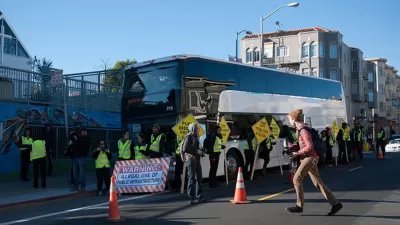The Google ferry was launched Jan. 6 at the Port of San Francisco for its inaugural trip to Redwood City, where Google workers would presumably be bussed to its Mountain View HQ. No word yet whether it was greeted by protests met by its buses in S.F.
Cole Chapman writes that "the ferry runs twice in the morning and twice at the end of the day." He indicates that the demonstrations, some of which have become destructive against the ubiquitous Google buses within San Francisco as they are seen as symbols of tech-driven gentrification, may have prompted the employer to seek less visible ways to transport its workers.
“We certainly don’t want to cause any inconvenience to SF residents and we’re trying alternative ways to get Googlers to work,” said Google in a statement provided to Re/code.
As noted here on Wednesday, Google and other operators of exclusive luxury buses transporting workers south to the Peninsula and Silicon Valley "will require permits and payments under a new 18-month pilot program." The San Francisco Chronicle editorialized on Wednesday, "One Google bus means 50 or more cars taken off the road, transit experts estimate. But the lumbering, dark-tinted vehicles dawdle at Muni bus stops, straddle driving lanes and are a handy stand-in for the numerous ills that afflict San Francisco life, circa 2014."
According to the KPIX broadcast, unlike the region's congested highways, there's plenty of unused capacity on San Francisco Bay, and the Port appeared to welcome the new business. Allen Martin of KPIX writes that "the Triumphant holds 149 passengers (and) the ride takes about 47 minutes each way."
FULL STORY: Google contracts catamaran ferry for employees

Alabama: Trump Terminates Settlements for Black Communities Harmed By Raw Sewage
Trump deemed the landmark civil rights agreement “illegal DEI and environmental justice policy.”

Study: Maui’s Plan to Convert Vacation Rentals to Long-Term Housing Could Cause Nearly $1 Billion Economic Loss
The plan would reduce visitor accommodation by 25% resulting in 1,900 jobs lost.

Planetizen Federal Action Tracker
A weekly monitor of how Trump’s orders and actions are impacting planners and planning in America.

Wind Energy on the Rise Despite Federal Policy Reversal
The Trump administration is revoking federal support for renewable energy, but demand for new projects continues unabated.

Passengers Flock to Caltrain After Electrification
The new electric trains are running faster and more reliably, leading to strong ridership growth on the Bay Area rail system.

Texas Churches Rally Behind ‘Yes in God’s Back Yard’ Legislation
Religious leaders want the state to reduce zoning regulations to streamline leasing church-owned land to housing developers.
Urban Design for Planners 1: Software Tools
This six-course series explores essential urban design concepts using open source software and equips planners with the tools they need to participate fully in the urban design process.
Planning for Universal Design
Learn the tools for implementing Universal Design in planning regulations.
Caltrans
Smith Gee Studio
Institute for Housing and Urban Development Studies (IHS)
City of Grandview
Harvard GSD Executive Education
Toledo-Lucas County Plan Commissions
Salt Lake City
NYU Wagner Graduate School of Public Service



























